Marchés
Lors de la conception d’une intervention humanitaire et de la prise de décisions quant à l’utilisation des transferts monétaires, l’analyse générale des options de réponse doit inclure une analyse de marché. Il est prouvé qu’offrir un soutien ciblant le fonctionnement des marchés accélère la reprise et accroît la résilience dans les zones affectées par une catastrophe.
De nombreuses organisations ont investi dans la mise au point d’outils visant à faciliter l’analyse de marché et réfléchissent à la mise en place de programmes basés sur les marchés plus holistiques. Elles envisagent des interventions tirant profit du marché (basées notamment sur des transferts monétaires aux populations affectées), ainsi que des interventions soutenant directement les marchés (comme l’octroi de subventions conditionnelles aux vendeurs/euses pour la remise en condition du marché).
Initiatives associées
Contenu associé

1.2 Introduction à l’analyse de marché
Cours
Ce cours de 30 minutes offre une introduction à l’analyse de marché pour les contextes d’urgence. Il contient des contributions d'experts dans ce domaine. Ce cours a été développé en collaboration avec l'International Rescue Committee et le CALP Network et grâce au financement d’USAID/OFDA et de l’Agence Suisse pour le Développement et la Coopération. Il est destiné aux...

2.4 Un guide pratique pour l’analyse de marché
Cours
Ce cours en ligne de 3.5 heures vise à fournir aux équipes qui conduiront des analyses de marchés en contextes humanitaires une compréhension approfondie de la théorie et des étapes à suivre afin de leur permettre de comprendre le pourquoi et le comment du processus à suivre. Les participants seront guides à travers un scenario d'analyse de marchés d'urgence. Ce cours s'appuie sur...
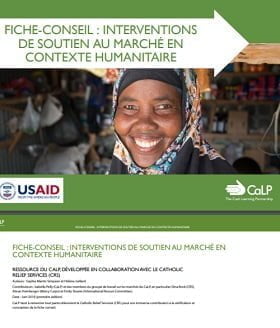
Fiche-Conseil : Interventions de soutien au marché en contexte humanitaire
Guides et outils
La fiche conseil définit le programme de soutien au marché en contexte humanitaire et le décrit dans la pratique. Elle permet aux praticiens humanitaires d’envisager systématiquement des interventions de soutien au marché, parallèlement à d’autres activités du programme. Le champ d’application comprend des interventions de soutien au marché axées sur l’offre/la disponibilité...
Thematic lead
Latest
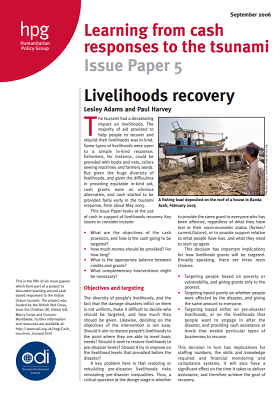
Learning from cash responses to the tsunami: Issue Paper 5: Livelihoods recovery
Report
This is the fifth of six issue papers which form part of a project to document learning around cash-based responses to the Indian Ocean tsunami. The project was funded by the British Red Cross, Save the Children UK, Oxfam GB, Mercy Corps and Concern Worldwide. This Issue Paper looks at the use of cash in...
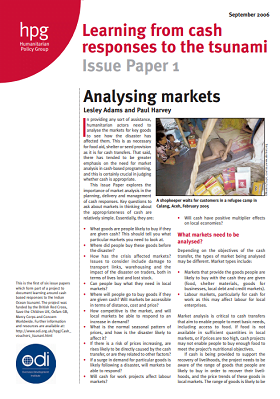
Learning from cash responses to the tsunami: Issue Paper 1: Analysing markets
Report
This is the first of six issue papers which form part of a project to document learning around cash-based responses to the Indian Ocean tsunami. The project was funded by the British Red Cross, Save the Children UK, Oxfam GB, Mercy Corps and Concern Worldwide. This 5-page Issue Paper explores the broad...
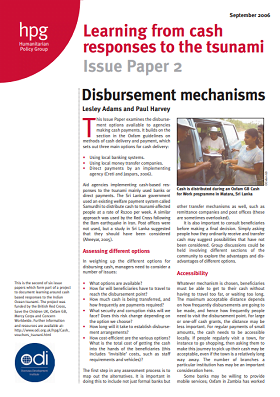
Learning from cash responses to the tsunami: Issue Paper 2: Disbursement mechanisms
Report
This is the second of six issue papers which form part of a project to document learning around cash-based responses to the Indian Ocean tsunami. The project was funded by the British Red Cross, Save the Children UK, Oxfam GB, Mercy Corps and Concern Worldwide. This 5-page Issue Paper examines the...

Independent Evaluation of Oxfam GB Malawi’s Emergency Cash – Transfer Programme
Case Study
Poor rainfall in Malawi in the 2004/2005 growing season resulted in significantly reduced cereal and non-cereal food production in the country, leaving up to 4 million people in need of assistance. In response, Oxfam planned a programme in southern Malawi, which included a ‘pilot’ cash-transfer...

Hurricanes Katrina and Rita Disaster Relief
Report
Hurricanes Katrina and Rita destroyed homes and displaced millions of individuals. In the wake of these natural disasters, the Federal Emergency Management Agency (FEMA) responded to the need to provide aid quickly through the Individuals and Households Program (IHP), which provides housing assistance,...
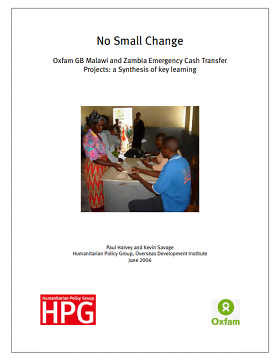
No small change: Oxfam GB Malawi and Zambia emergency cash transfer projects: A synthesis of key learning
Case Study
This learning document uses Oxfam GB’s experience of emergency cash transfer programming in Malawi and Zambia to draw out some important lessons in using cash. It examines the two programmes and the findings of the evaluations and asks the question, “Is cash more cost-effective than food aid?”...
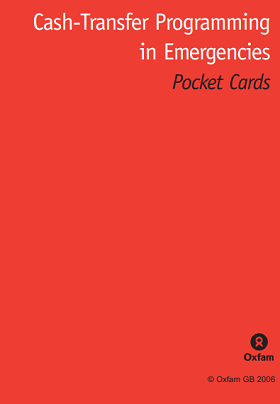
Cash-transfer programming in emergencies – Pocket cards
Report
In emergencies, distributing cash can often meet people’s immediate needs more quickly and appropriately than the direct distribution of commodities. Cash gives people choices and thereby preserves their dignity. These 15 cards contain key elements from the book, which draws on Oxfam’s experience to...

Transferts d’argent: Programmation pour les situations d’urgences
Guides et outils
Un guide compact et concis visant à soutenir les gestionnaires de programmes afin d’évaluer si le cash est la réponse la plus appropriée en cas d’urgence et de choisir entre différents types d’interventions monétaires. Ce guide est basé sur l’expérience d’Oxfam GB sur cinq ans...

Mapping the Risks of Corruption in Humanitarian Action
Report
The issue of corruption in emergency relief and rehabilitation is a key concern for practitioners, who invest considerable resources and energy in trying to minimise it. However, it has barely been discussed in policy terms, and little researched. This paper aims to map the risks of corruption in the...

Cash Grants and Microfinance in Livelihood Recovery: Experiences from tsunami-affected areas of Sri Lanka
Report
The devastating tsunami that hit Sri Lanka on 26 December 2004 killed over 35,000 people, making it the worst natural disaster in the country’s recorded history. Over 200,000 people were estimated to have lost their livelihoods, half of them in the fishing sector. The major objectives of the study is...

Voucher Distributions
Report
This document is largely based on the experience gained by GOAL’s team in its response to the 2005 earthquake in Pakistan and aims to discuss:
1. Options for transferring resource to a community in an emergency situation.
2. The appropriateness of the different methods of resource transfer to different
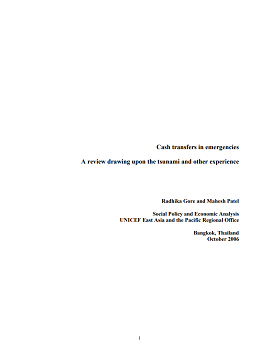
Cash Transfers in Emergencies: A Review Drawing upon the Tsunami and Other Experience
Report
This 2006 document from the Social Policy and Economic Analysis office of UNICEF (East Asia and the Pacific Region) draws upon examples from the tsunami and other contexts to explore cash transfer experience in emergencies. It presents existing evidence of impact of cash transfers on children; reasons...

Market-Based Food Assistance Pilot Project Pidie and Lhokseumawe Districts, Banda Aceh: Report of Final Evaluation
Report
This report represents the findings of a final evaluation undertaken for Save the Children Indonesia/Banda Aceh of its Market-based Food Assistance (MBFA) Pilot Project carried out in Pidie and Lhokseumawe districts in early 2006. For 3 months, from February-April 2006, SC/BA implemented a pilot project,...
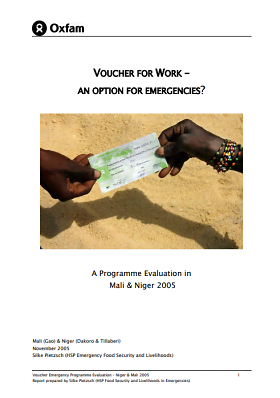
Voucher for work: An option for emergencies?
Report
This Oxfam GB evaluation report gathers successes, constraints and lessons learned during the implementation of two voucher programmes in Mali and Niger, following the food crisis in 2005. It begins by examining the appropriateness of the programme decision-making, and then looks at the two programme...

Mapping the Market: A framework for rural enterprise development policy and practice
Guidelines and Tools
Markets matter to the rural poor. It is increasingly clear that in tackling rural poverty, market-related issues – including access to information, institutions, linkages and trade rules – are vital considerations. Failure to address these issues means that the benefits of other developments...
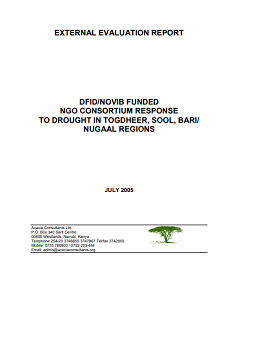
DFID/NOVIB Funded NGO Consortium Response to Drought in Togdheer, Sool, Bari/ Nugaal Regions
Case Study
This is a summary of the June 2005 evaluation of the NGO Consortium response to drought in Togdheeer, Sool, Sanaag and Bari/ Nugaal in Somaliland. The consortium response to drought was meant to provide cash to targeted drought-affected households to help them meet their basic needs. Important among the...

ODI/UNDP Cash Learning Project Workshop in Aceh, Indonesia
Case Study
This is a report from a workshop on sharing experiences and learning for cash-based interventions. The workshop was held in Aceh, Indonesia in July 2005. The workshop included case studies from Mercy Corps, Panglima Laot, Save the Children, British Red Cross, Swiss Development Corporation, Oxfam and...

Evaluation of OFDA Cash for Relief Intervention in Ethiopia: Final Report
Report
As a result of insufficient rainfall in 2002 and 2003, the Ethiopian Disaster Prevention and Preparedness Commission (DPPC) issued an international appeal for food assistance in December 2003. Some 7.2 million people were estimated to be at risk in 2004. An OFDA/DART’s response to this crisis resulted...

Clients First! A Rapid Market Appraisal Tool Kit: Theoretical background and experiences from various RMA events
Guidelines and Tools
Clients First! focuses on one vital element of market research that should be carried out before deciding to support at the agricultural production side or to proceed with an agribusiness project: a market feasibility study. The publication describes the main characteristics of a basic market study as...

Seed vouchers and fairs: A manual for seed-based agricultural recovery in Africa
Guidelines and Tools
This manual describes a new (2002) approach to post-emergency seed distribution in Africa, where farmers receive not free seed but vouchers that can be exchanged for seed at a specially organized seed fair. Seed fairs rely on commercial seed firms (where they are in operation), as well as local seed...



